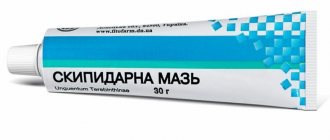Pharmacodynamics and pharmacokinetics
Pharmacodynamics
Heparin, which is part of the drug, is a direct anticoagulant. It has antithrombotic, decongestant, anti-inflammatory, antiproliferative effects. Reduces platelet thrombin activity . Heparin, improving microcirculation and activating tissue metabolism, accelerates the resorption of hematomas and blood clots , reduces swelling and restores the patency of veins .
Pharmacokinetics
Heparin is absorbed in small quantities into the blood, where the maximum concentration of the drug occurs after -8 hours. Heparin is eliminated through the kidneys.
Trombless®
Manufacturer: NIZHFARM OJSC (Russia)
◊ gel for external use approx. 1000 units/1 g: tubes 10 g, 20 g, 30 g, 40 g or 50 g Reg. No.: LS-000112
Clinical and pharmacological group:
Drug with antithrombotic effect for external use
Release form, composition and packaging
◊ Gel for external use
colorless or with a slight yellowish tint, transparent, with a specific odor.
| 1 g | |
| heparin sodium | 1000 units* |
Excipients:
ethanol (ethyl alcohol) - 240 mg, methyl parahydroxybenzoate (nipagin, methylparaben) - 1.2 mg, propyl parahydroxybenzoate (nipazol, propylparaben) - 300 mcg, diethanolamine (2,2′-iminodiethanol) - up to 14 mg (to obtain a gel with a pH of 7.5 up to 8.7), carbomer (carbopol) - up to 15 mg, water (purified water) - up to 1 g.
* 8.33 mg with heparin activity 120 U/mg.
10 g - aluminum tubes (1) - cardboard packs. 20 g – aluminum tubes (1) – cardboard packs. 30 g – aluminum tubes (1) – cardboard packs. 40 g – aluminum tubes (1) – cardboard packs. 50 g - aluminum tubes (1) - cardboard packs. 10 g - polyethylene tubes (1) - cardboard packs. 20 g - polyethylene tubes (1) - cardboard packs. 30 g - polyethylene tubes (1) - cardboard packs. 40 g - polyethylene tubes (1) - cardboard packs. 50 g - polyethylene tubes (1) - cardboard packs.
Description of the active components of the drug "Trombless®"
pharmachologic effect
Direct anticoagulant. It has anti-inflammatory, antiproliferative, decongestant and analgesic effects. Reduces platelet aggregation, binds to antithrombin III, preventing the transition of prothrombin to thrombin. Inhibits thrombin activity. Reduces the activity of hyaluronidase, increases the fibrinolytic properties of blood.
Trombless improves microcirculation and activates tissue metabolism, thereby accelerating the processes of resorption of hematomas and blood clots, ultimately restoring the patency of the veins, clinically this is accompanied by a pronounced analgesic and anti-inflammatory effect.
Indications
- migrating phlebitis (including with chronic varicose veins and varicose ulcers);
— thrombophlebitis of superficial veins;
— local swelling and aseptic infiltrates;
- complications arising after surgical operations on the veins;
— subcutaneous hematomas (including after phlebectomy);
- injuries, bruises of joints, tendons, muscle tissue.
Dosage regimen
The drug should be used externally: 3-10 cm of gel is applied with rubbing movements to the skin over the affected area 1-3 times a day.
For thrombosis of hemorrhoidal veins, pads with applied gel are used.
Side effect
Local reactions:
with prolonged use, skin hyperemia and allergic reactions are possible.
Contraindications
- ulcerative-necrotic, purulent processes on the skin;
— traumatic violation of the integrity of the skin;
- hypersensitivity to the components of the drug.
Carefully:
increased tendency to bleeding, thrombocytopenia.
Pregnancy and lactation
The drug can be used during pregnancy and lactation according to indications.
special instructions
Trombless does not have a local irritating effect.
Overdose
Data on overdose of the drug Trombless are not provided.
Drug interactions
Combined use of the drug with oral anticoagulants may cause an increase in prothrombin time.
Conditions for dispensing from pharmacies
The drug is approved for use as a means of OTC.
Storage conditions and periods
List B. The drug should be stored out of the reach of children at a temperature not exceeding 25°C. Shelf life: 2 years.
Drug interactions
Combined use of the drug with oral anticoagulants may cause an increase in prothrombin time.
Analogs
Level 4 ATC code matches: Girudoproct
Geparoid Zentiva
Heparin ointment
Heparin
Gepatrombin G
Lyoton
Venolife
Hepatrombin
Heparin-Acrigel, Lyoton 1000, Thrombogel, Gepatrombin ointment, Heparin ointment . Analogs have the same active ingredient and are identical in pharmacological action and indications for use.
Directions for use and doses
Trombless®
Externally. A column of gel 3–10 cm long is applied with light rubbing movements to the skin over the affected area 1–3 times a day. The gel is used daily, on average from 3 to 7 days. For thrombosis of hemorrhoidal veins, pads with applied gel are used. The duration of treatment is determined by the doctor. Trombless® does not have a local irritating effect.
Trombless® Plus
Externally, apply a thin layer to the skin above and around the affected area, evenly distributing over the surface of the skin with light circular movements 2-3 times a day. The course of treatment is 2–3 weeks, with repetition in case of relapse of the disease.
For trophic ulcers with weak exudation, before use, the wound surface is cleaned of exudate and necrotic tissue, if necessary, washed with a solution of hydrogen peroxide 3%, nitrofural 1:5000 or chlorhexidine 0.05% and dried. The gel is applied in an even thin layer over the entire affected surface and a sterile gauze bandage is applied. The dressing is changed once a day. With the open method of treatment, the drug is applied 1-2 times a day. The duration of treatment is determined by the dynamics of epithelization.
For subcutaneous hematomas, localized edema, aseptic infiltrates, injuries, bruises and similar conditions, apply to the affected area 2-3 times a day until the normal state of the damaged tissue is completely restored.
Reviews of Trombless
Gels and creams are often combined under the term "ointment". The methods of applying the ointment differ, and this affects their clinical effectiveness. In this case, lightly rub into the skin over the problem area. In addition, it must be applied to clean areas, which increases efficiency and reduces treatment time.
Trombless gel, reviews of which are mostly positive, did not cause any adverse reactions. Those who have used it note a quick effect: a decrease in pain and heaviness in the legs, the disappearance of swelling, fatigue and cramps in the calf muscles. Ease of use is also important - the gel is completely resorbed and does not contaminate clothes, and is easily washed off the skin with water. As reviews of Trombless testify, many consider it the best remedy for hematomas (bruises): if you immediately lubricate the bruise, a bruise will not form, and the one that has already formed will disappear in one day.
Nosological classification (ICD-10)
- I80 Phlebitis and thrombophlebitis
- I80.0 Phlebitis and thrombophlebitis of superficial vessels of the lower extremities
- I83 Varicose veins of the lower extremities
- I84 Hemorrhoids
- L98.6 Other infiltrative diseases of the skin and subcutaneous tissue
- R60.0 Localized edema
- T14.0 Superficial injury to unspecified body area
- T14.6 Injury to muscles and tendons of unspecified body area
- T14.9 Injury, unspecified
- Z100* CLASS XXII Surgical practice
Trombless price, where to buy
You can buy the ointment in Moscow pharmacies, which are presented on the website of the Federal Information Service www.poisklekarstv.ru. Information is updated daily.
The price of Trombless depends on the amount of the drug in the tube. The price for a 50 g package ranges from 231 rubles. up to 383 rub. The cost of packaging 30 g is from 180 rubles. up to 258 rub. Gel Trombless, the price in Ukraine for which ranges from 138 UAH. up to 180 UAH, can be purchased in pharmacies provided on the website medbrowse.com.ua.
- Online pharmacies in RussiaRussia
ZdravCity
- Trombless plus gel 1000 units/g 30gNizhpharm OJSC RUB
478 order - Trombless gel 1000 units/g 30 g Nizhpharm OJSC
422 rub. order
- Trombless plus gel 1000 units/g 50gNizhpharm OJSC
RUR 699 order
Compound
Trombless®
| Gel for external use | 1 g |
| active substance: | |
| heparin sodium (0.00833 g with activity of heparin sodium - 120 IU/mg) | 1000 IU |
| excipients: ethanol (ethyl alcohol) - 240 mg; methyl parahydroxybenzoate (nipagin, methylparaben) - 1.2 mg; propyl parahydroxybenzoate (nipazole, propylparaben) - 0.3 mg; diethanolamine (2,2-iminodiethanol) - up to 14 mg to obtain a gel with a pH of 7.5 to 8.7; carbomer (carbopol) - up to 15 mg; water (purified water) - up to 1 g |
Trombless® Plus
| Gel for external use | 1 g |
| active substances: | |
| heparin sodium (8.33 mg with activity of heparin sodium 120 IU/mg) | 1000 IU |
| troxerutin | 20 mg |
| dexpanthenol | 100 mg |
| benzocaine | 1 mg |
| excipients: ethanol - 100 mg; methyl parahydroxybenzoate - 1.5 mg; trolamine - 7 mg; carbomer - up to 10 mg; glycerol - 50 mg; water - up to 1 g |
Trombless
Trombless is a local direct-acting anticoagulant. Indicated for chronic venous insufficiency (CVI), thrombosis with inflammation of the walls of the superficial veins and the formation of a blood clot that closes the lumen of the vessel, edema and localized compactions formed in soft tissues, the occurrence of which is caused by the accumulation of cell elements, blood, lymph, subcutaneous hematomas, injuries and bruises muscles, joints, ligaments, tendons. In our country, the incidence of CVI is 32% in women and 19% in men. At risk are pregnant women, in whom this figure reaches 40-50%. During drug therapy during pregnancy, medications are required to ensure maximum safety for the health of the expectant mother and fetus and the reliability of the evidence base. The drug Trombless fully meets these criteria. It passed a whole series of clinical trials, one of which was conducted in Russia at the Department of Obstetrics and Gynecology of the Nizhny Novgorod State Medical Academy. Pregnant women with symptoms of CVI were selected as study participants and divided into two groups. The first group, in addition to standard treatment (the drug Phlebodia), used Trombless three times a day for 3 weeks, followed by a three-week break, and then another drug course of the same duration. Participants in the control group received standard treatment with Phlebodia. The study showed that the introduction of the drug Trombless into the basic therapy of CVI has a significantly positive effect in the complex treatment of CVI in pregnant women.
The use of the drug Trombles made it possible to quickly stop the clinical manifestations of CVI. At the end of the course of pharmacotherapy, pain was eliminated in 75% of women in the first group, while in the control group this figure was 54%. After the first drug course, swelling was not eliminated in only 7% of women in the first group, while in the control group this figure was 26%. During the study and after its completion, not a single participant experienced any undesirable side effects. The drug is practically not absorbed into the systemic circulation. Contraindications to taking Trombless: individual intolerance to the components, ulcerative-necrotic lesions and suppuration of the skin, mechanical damage to the skin, increased bleeding. A single dose is a strip of gel 3-10 cm long. Frequency of use is 1-3 times a day. The duration of the medication course is 3-7 days. The duration of pharmacotherapy is determined by the doctor. The only possible side effect: allergic reactions. Mild hyperemia is not clinically significant and cannot serve as a basis for discontinuing the drug. Trombless is not recommended to be taken simultaneously with NSAIDs, antihistamines and tetracycline antibiotics.
Trombless Plus 1mg/g+1000IU/g+100mn/g+20mg/g gel for external use tube, 50g
Registration Certificate Holder
NIZHFARM (Russia)
Dosage form
Medicine - Trombless® Plus (Trombless Plus)
Description
Gel for external use
transparent or translucent, from light yellow to yellow, a greenish tint is allowed; has a weak characteristic odor.
1 g
sodium heparin 1000 IU* troxerutin 20 mg dexpanthenol 100 mg benzocaine 1 mg
* 8.33 mg with sodium heparin activity 120 IU/mg.
Excipients
: ethanol, methyl parahydroxybenzoate, trolamine, carbomer, glycerol, water.
10 g - aluminum tubes (1) - cardboard packs. 20 g – aluminum tubes (1) – cardboard packs. 30 g – aluminum tubes (1) – cardboard packs. 40 g – aluminum tubes (1) – cardboard packs. 50 g - aluminum tubes (1) - cardboard packs. 100 g - aluminum tubes (1) - cardboard packs. 10 g - polyethylene tubes (1) - cardboard packs. 20 g - polyethylene tubes (1) - cardboard packs. 30 g - polyethylene tubes (1) - cardboard packs. 40 g - polyethylene tubes (1) - cardboard packs. 50 g - polyethylene tubes (1) - cardboard packs. 100 g - polyethylene tubes (1) - cardboard packs.
Indications
- symptom complex of chronic venous insufficiency (including against the background of varicose veins of the lower extremities), migratory phlebitis, thrombophlebitis of superficial veins;
- subcutaneous hematomas, localized edema and aseptic infiltrates;
- injuries and bruises of joints, tendons, muscle tissue;
- complications arising after surgical operations on the veins.
Contraindications for use
- hypersensitivity to the components of the drug;
- open infected wounds or wounds with heavy exudation at the site of intended application;
- children under 18 years of age (there are no data on the effectiveness and safety of the drug);
- pregnancy and lactation period.
With caution
Increased tendency to bleeding, thrombocytopenia.
pharmachologic effect
Combined drug.
Sodium heparin is a direct anticoagulant that has anti-inflammatory, antiproliferative, anti-edematous and analgesic effects. Reduces platelet aggregation, binds to antithrombin III, preventing the transition of prothrombin to thrombin. Inhibits thrombin activity. Reduces the activity of hyaluronidase, increases the fibrinolytic properties of blood. Improves microcirculation and activates tissue metabolism, thereby accelerating the processes of resorption of hematomas and blood clots, ultimately restoring the patency of the veins, clinically this is accompanied by a pronounced analgesic and anti-inflammatory effect.
Dexpanthenol - provitamin B5 - is converted in the skin into pantothenic acid, which is part of coenzyme A, which is involved in the processes of acetylation, carbohydrate and fat metabolism; stimulates skin regeneration, normalizes cellular metabolism, increases the strength of collagen fibers. It has a regenerating, vitamin, metabolic and anti-inflammatory effect.
Troxerutin is a flavonoid (derivative of rutin), has P-vitamin activity; has venotonic, angioprotective, decongestant, antioxidant and anti-inflammatory effects. Participates in redox processes, blocks hyaluronidase, stabilizes hyaluronic acid in cell membranes and reduces the permeability and fragility of capillaries, increases their tone. Increases the density of the vascular wall, reduces exudation of the liquid part of the plasma and diapedesis of blood cells. Reduces inflammation in the vascular wall, limiting the adhesion of platelets to its surface.
Benzocaine is a local anesthetic for superficial anesthesia. Reduces the permeability of the cell membrane to sodium ions, displaces calcium ions from receptors located on the inner surface of the membrane, and blocks the conduction of nerve impulses. Prevents the occurrence of pain impulses at the endings of sensory nerves and their conduction along nerve fibers. Benzocaine dilates superficial vessels, promoting the absorption of heparin.
Drug interactions
Combined use of the gel with oral anticoagulants may cause prolongation of prothrombin time. Non-narcotic analgesics and anticholinesterase drugs enhance the effect of the benzocaine included in the drug. Benzocaine reduces the antibacterial activity of sulfonamides.
Dosage regimen
Externally, apply a thin layer to the skin above and around the affected area, evenly distributing over the surface of the skin with light circular movements 2-3 times a day. The course of treatment is 2-3 weeks, repeated if the disease relapses.
For
trophic ulcers with weak exudation,
before use, the wound surface is cleaned of exudate and necrotic tissue, if necessary, washed with a solution of hydrogen peroxide 3%, nitrofural 1:5000 or chlorhexidine 0.05% and dried. The gel is applied in an even thin layer over the entire affected surface and a sterile gauze bandage is applied. The dressing is changed once a day. With the open method of treatment, the drug is applied 1-2 times a day. The duration of treatment is determined by the dynamics of epithelization.
For subcutaneous hematomas, localized edema, aseptic infiltrates, injuries, bruises
and similar conditions, apply to the affected area 2-3 times a day until the normal state of the damaged tissue is completely restored.
Overdose
No cases of overdose of Trombless® Plus gel have been reported.
Side effect
With prolonged use of the drug, local reactions are possible in the form of skin hyperemia, decreased sensitivity (at the site of application), allergic reactions (skin rash, itching).
special instructions
Not intended for use in ophthalmology, for intravaginal administration.
Storage conditions
Store the drug out of the reach of children at a temperature not exceeding 25°C.
Best before date
Shelf life: 2 years. Do not use the drug after the expiration date.
Use during pregnancy and breastfeeding
Restrictions during pregnancy - Contraindicated. Restrictions when breastfeeding - Contraindicated. The use of Trombless® Plus during pregnancy and breastfeeding is contraindicated.
Terms of sale
The drug is available without a prescription.
Contacts for inquiries
STADA (Russia)
603950 Nizhny Novgorod st. Salganskaya, 7 Tel. Fax E-mail



